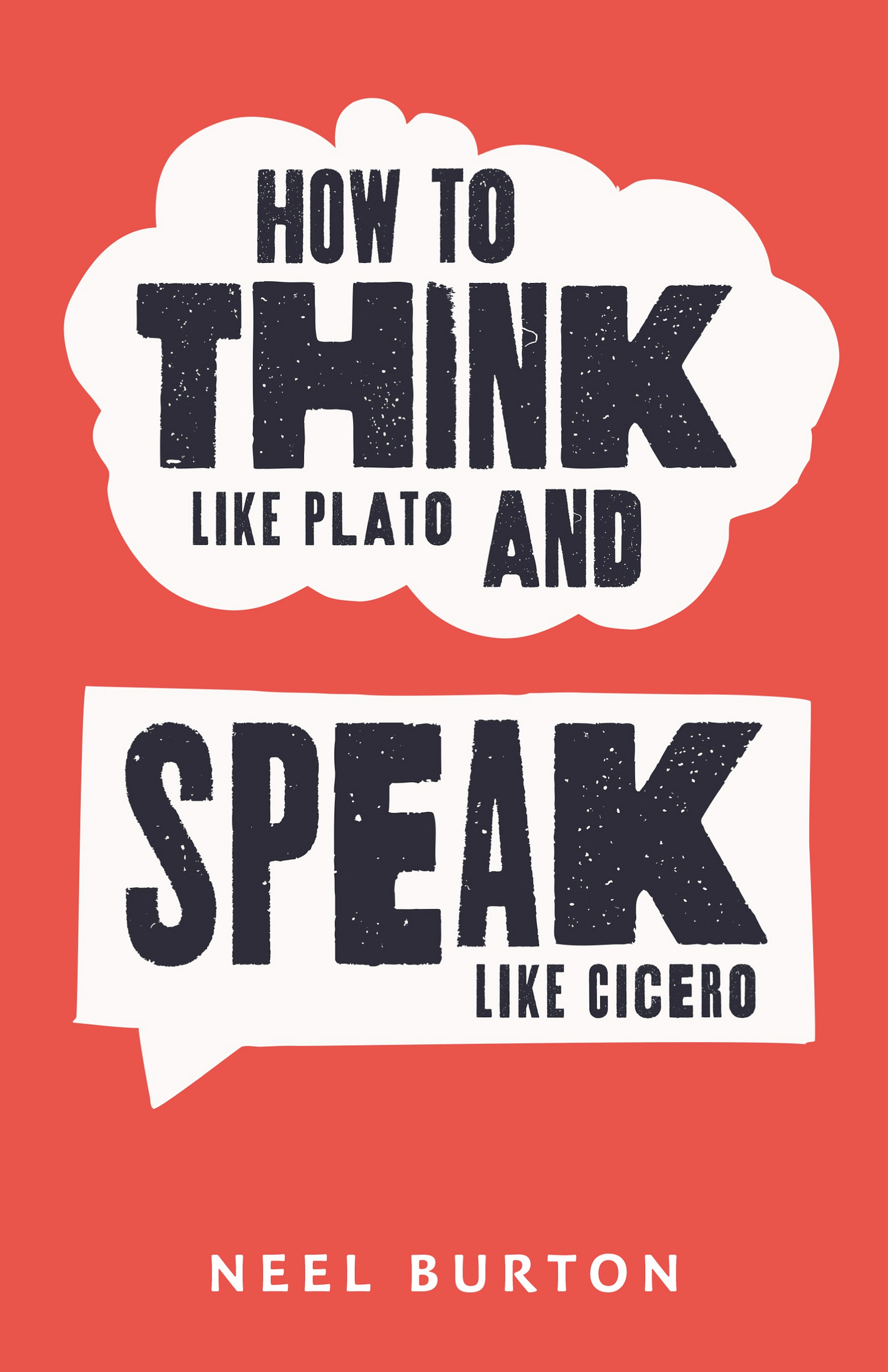PAC would like to thank Neel Burton for graciously providing this exclusive excerpt from his latest title How to Think Like Plato and Speak Like Cicero.
What is Wisdom?
Every time I utter the word ‘wisdom’, someone giggles or sneers. Wisdom, more so even than expertise, does not sit comfortably in an egalitarian, anti-elitist society. In an age dominated by materialism and consumerism, science and technology, and specialization and compartmentalization, it is too loose, too grand, and too mysterious a concept. With our heads in our smartphones and tablets, in our bills and bank statements, we simply do not have the time or mental space for it, or even the idea of it.
But things were not always thus. The word ‘wisdom’ features 222 times in the Old Testament, which includes all of seven so-called ‘wisdom books’: Job, Psalms, Proverbs, Ecclesiastes, the Song of Solomon, the Book of Wisdom, and Sirach.
Here is Ecclesiastes 7:12:
For wisdom is a defence, and money is a defence: but the excellency of knowledge is, that wisdom giveth life to them that have it.
The word ‘philosophy’ literally means ‘the love of wisdom’, and wisdom is the overarching aim of philosophy, or, at least, ancient philosophy.
In Plato’s Lysis, Socrates tells the young Lysis that, without wisdom, he will be of no worth to anyone:
And therefore, my boy, if you are wise, all men will be your friends and kindred, for you will be useful and good; but if you are not wise, neither father, nor mother, nor kindred, nor anyone else, will love you.
The patron goddess of Athens, the city in which the Lysis is set, is none other than Athena, goddess of wisdom, who sprung out from the skull of Zeus. Her symbol, and the symbol of wisdom, is the owl, a bird of prey which cleaves through darkness.
Indeed, ‘wisdom’ derives from the Proto-Indo-European root weid-, ‘to see’, and is related to a great many words including: advice, druid, evident, guide, Hades, history, idea, idol, idyll, view, Veda, vision, and visit. In Norse mythology, Odin gouged out one of his eyes and offered it to Mimir in exchange for a drink from the well of knowledge and wisdom, symbolically trading one mode of perception for another, higher one.
* * *
But what exactly is wisdom? People often speak of ‘knowledge and wisdom’ as though they might be closely related or even the same thing. So one hypothesis is that wisdom is knowledge, or a great deal of knowledge. If wisdom is knowledge, then it has to be a certain kind of knowledge, or else learning the phonebook, or the names of all the rivers in the world, might count as wisdom. And if wisdom is a certain kind of knowledge, then it is not scientific or technical knowledge, or else every contemporary person would be wiser than the wisest of ancient philosophers. Any twenty-first century school-leaver would be wiser than a Seneca or Socrates.
Remember: the Delphic oracle pronounced Socrates the wisest of all people not because he knew everything or anything, but because he knew the extent of what he did not know.
Still, there seems to be more to wisdom than mere ‘negative knowledge’, or else I could simply be super-skeptical about everything and count myself wise…
Or maybe wisdom consists in having high epistemic standards, that is, in having a high bar for believing something, and an even higher bar for calling that belief knowledge. But then we are back to a picture of wisdom as something like science…
* * *
In Plato’s Meno, Socrates notices that people of wisdom and virtue seem to be very poor at imparting those qualities: Themistocles was able to teach his son Cleophantus skills such as standing upright on horseback and shooting javelins, but no one ever credited the poor wretch with anything like his father’s wisdom; and the same could also be said of Lysimachus and his son Aristides, Pericles and his sons Paralus and Xanthippus, and Thucydides and his sons Melesias and Stephanus. And if wisdom cannot be taught, not even by the wisest of Athenians, then it is not a kind of knowledge.
If wisdom cannot be taught, how, asks Meno, did good people come about? Socrates replies that right action is possible under guidance other than that of knowledge: a person who has knowledge of the way to Larisa (a city-state in Thessaly) may make a good guide, but a person who has only correct opinion about the way, but has never been and does not know, might make an equally good guide. Since wisdom cannot be taught, it cannot be knowledge; and if it cannot be knowledge, it can only be correct opinion—which explains why paragons of wisdom such as Themistocles, Lysimachus, and Pericles were unable to impart their wisdom even unto their own sons. Wise people are no different from soothsayers, prophets, and poets, who say many true things when they are divinely inspired but have no real knowledge of what they are saying.
* * *
Aristotle gives us another clue in the Metaphysics, when he says that wisdom is the understanding of causes. None of the five senses are regarded as wisdom because, although they give the most authoritative knowledge of sense particulars, they are unable to discern the distal causes of anything. Similarly, we suppose artists to be wiser than artisans because artists know the ‘why’ or cause, and can therefore teach, whereas artisans do not, and cannot. In other words, wisdom is the understanding of the right relations between things, which calls for more distal and removed perspectives, and maybe also the ability or willingness to shift between perspectives.
In the Tusculan Disputations, Cicero cites as a paragon of wisdom the pre-Socratic philosopher Anaxagoras, who, upon being informed of the death of his son, said, ‘I knew that I begot a mortal’ [Sciebam me genuisse mortalem]. For Cicero, true sapience consists in preparing oneself for every eventuality so as never to be taken, or overtaken, by surprise. And it is true that wisdom, the understanding of causes and connexions, has forever been associated with both insight and foresight.
In sum, wisdom is not so much a kind of knowledge as a way of seeing, or ways of seeing. When we take a few steps back, like when we stand under the shower or go on holiday, we begin to behold the bigger picture. In common parlance, ‘wisdom’ has two opposites: ‘foolishness’ and ‘folly’, which both derive from the Latin follis [bellows, bag], and involve, respectively, lack and loss of perspective.
For some thinkers, notably Robert Nozick (d. 2002), wisdom has a practical dimension in that it involves an understanding of the goals and values of life, the means of achieving those goals, the potential dangers to avoid, and so on. I agree, but I also think that all this naturally flows from perspective: if you have right or proper perspective, you cannot fail to understand the goals and values of life or fail to act on that understanding. This chimes with Socrates’ claim that nobody knowingly does wrong: people only do wrong because, from their limited perspective, it seems like the right or best thing to do. In the words of Jesus from the cross, ‘Father, forgive them; for they know not what they do.’
In cultivating a broader perspective, it helps, of course, to be knowledgeable, but it also helps to be intelligent, reflective, open-minded, and disinterested—which is why we often seek out and pay for ‘independent’ advice.
Above all, it helps to be courageous, because the view from on high, though it can be exhilarating, and ultimately liberating, is at first terrifying … not least because it conflicts with so much that we have been taught or enculturated to think.
Courage, said Aristotle, is the first of the human qualities, because it is the one which underwrites all the others.
Neel Burton is a psychiatrist, philosopher, and wine-lover who lives and teaches in Oxford. As mental health and humanity face deepening crises, he is increasingly turning to the wisdom of the ancients for answers. Through his work, Neel seeks to bridge the gap between ancient philosophy and modern challenges, offering insights that resonate deeply in today’s troubled world.







Such a unique and deep teaching about the historical roots and the meaning of the word ‘wisdom’!
In Buddhist teachings wisdom seems to be understood as clear seeing without the obstacles of a conditioned mind filtering out the reality of how things actually are.